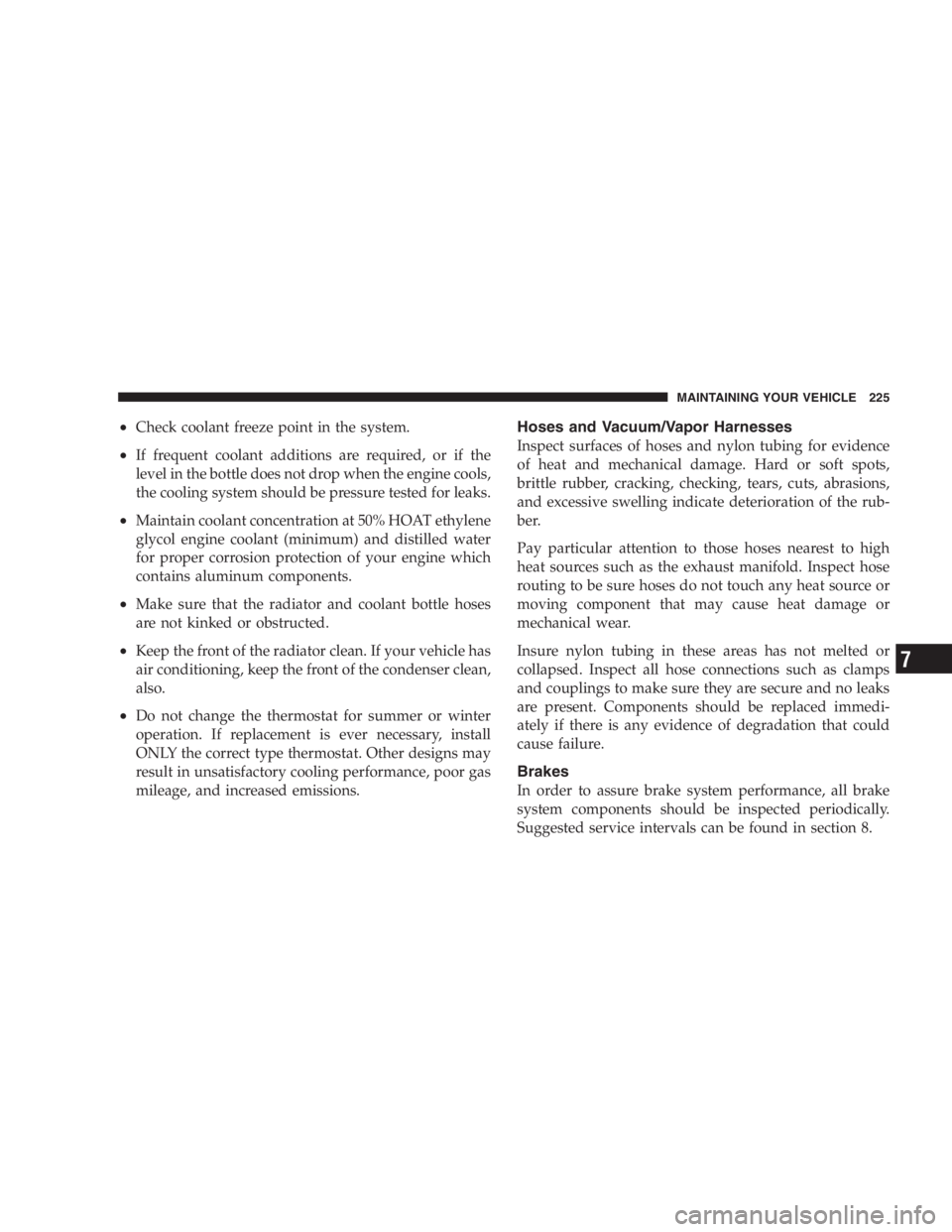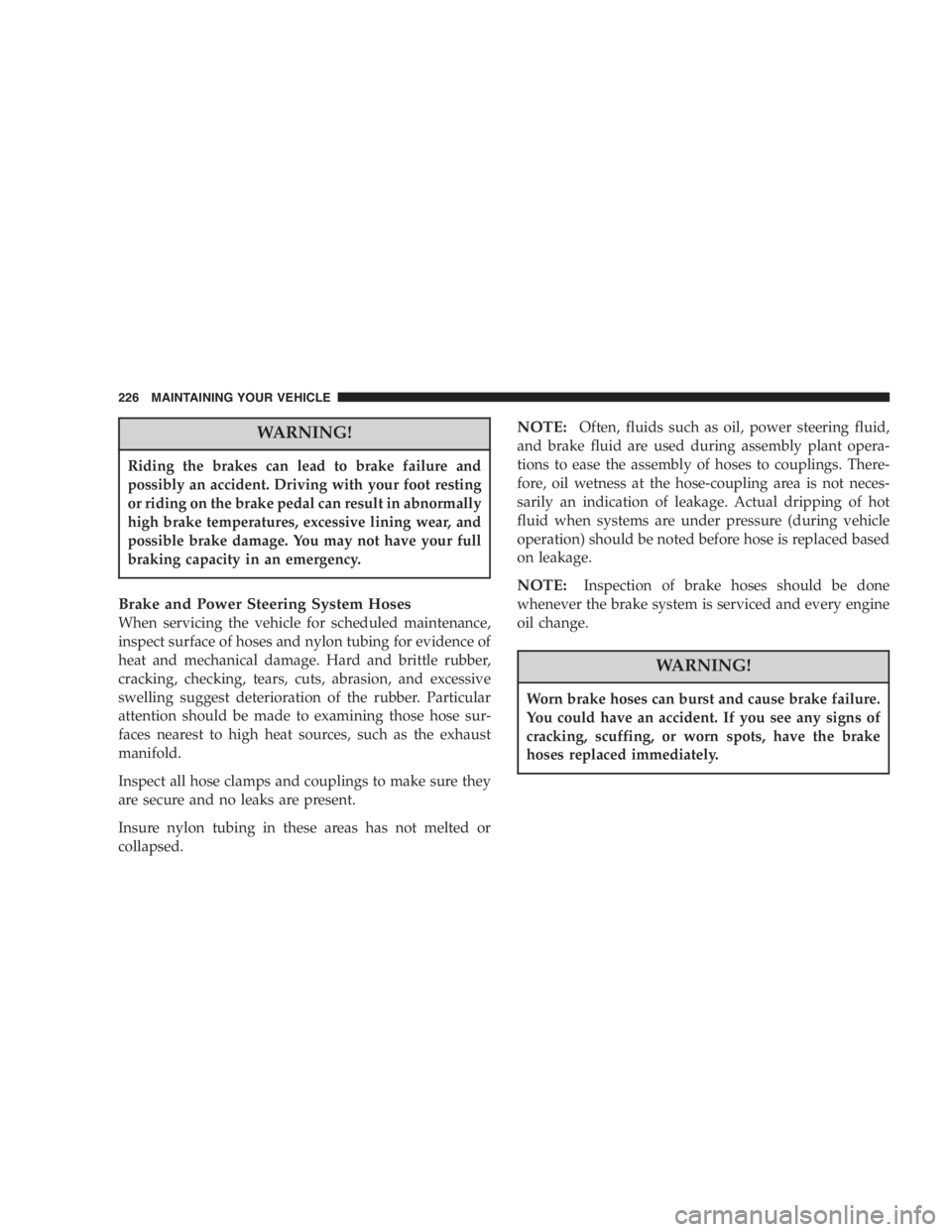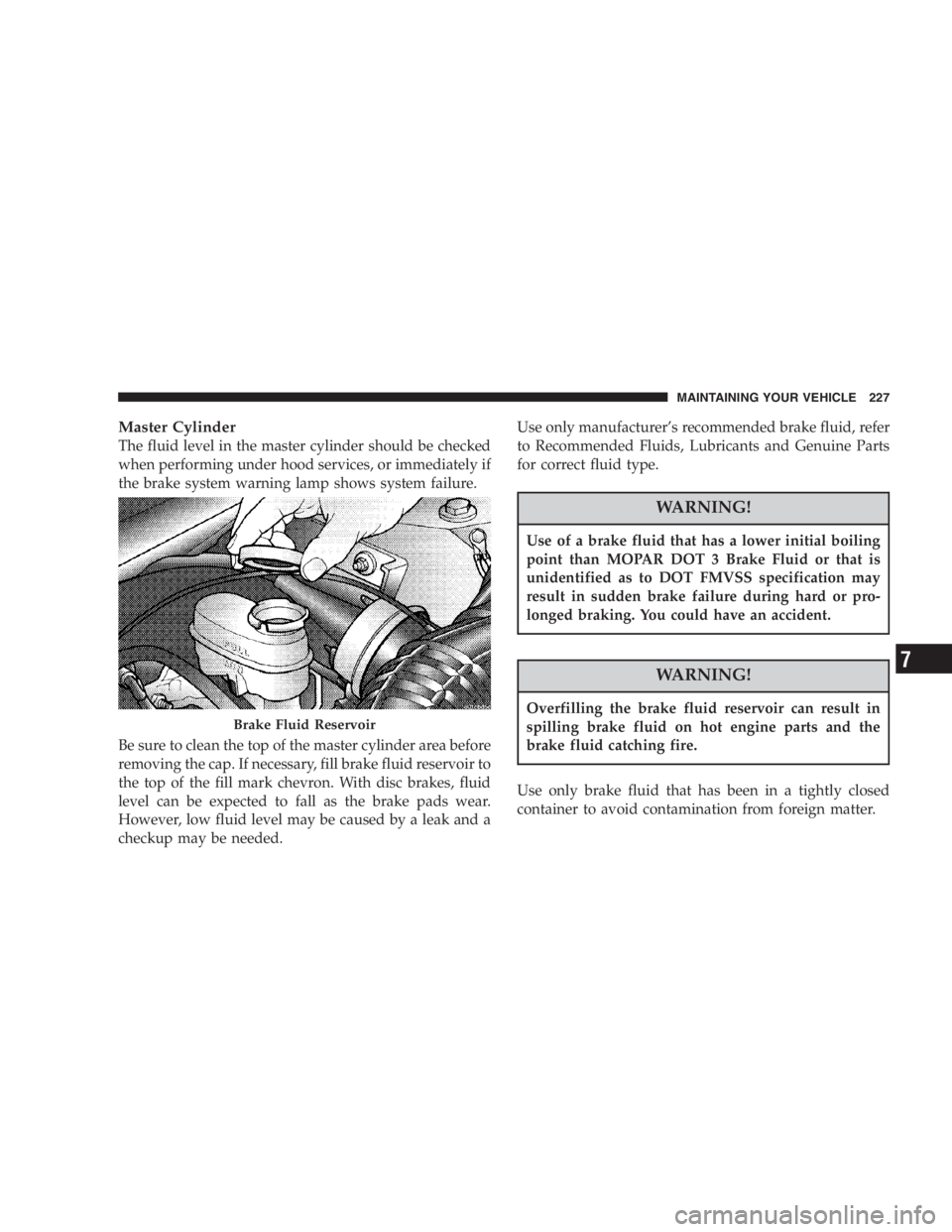2005 DODGE STRATUS SEDAN brakes
[x] Cancel search: brakesPage 225 of 293

•Check coolant freeze point in the system.
•If frequent coolant additions are required, or if the
level in the bottle does not drop when the engine cools,
the cooling system should be pressure tested for leaks.
•Maintain coolant concentration at 50% HOAT ethylene
glycol engine coolant (minimum) and distilled water
for proper corrosion protection of your engine which
contains aluminum components.
•Make sure that the radiator and coolant bottle hoses
are not kinked or obstructed.
•Keep the front of the radiator clean. If your vehicle has
air conditioning, keep the front of the condenser clean,
also.
•Do not change the thermostat for summer or winter
operation. If replacement is ever necessary, install
ONLY the correct type thermostat. Other designs may
result in unsatisfactory cooling performance, poor gas
mileage, and increased emissions.
Hoses and Vacuum/Vapor Harnesses
Inspect surfaces of hoses and nylon tubing for evidence
of heat and mechanical damage. Hard or soft spots,
brittle rubber, cracking, checking, tears, cuts, abrasions,
and excessive swelling indicate deterioration of the rub-
ber.
Pay particular attention to those hoses nearest to high
heat sources such as the exhaust manifold. Inspect hose
routing to be sure hoses do not touch any heat source or
moving component that may cause heat damage or
mechanical wear.
Insure nylon tubing in these areas has not melted or
collapsed. Inspect all hose connections such as clamps
and couplings to make sure they are secure and no leaks
are present. Components should be replaced immedi-
ately if there is any evidence of degradation that could
cause failure.
Brakes
In order to assure brake system performance, all brake
system components should be inspected periodically.
Suggested service intervals can be found in section 8.
MAINTAINING YOUR VEHICLE 225
7
Page 226 of 293

WARNING!
Riding the brakes can lead to brake failure and
possibly an accident. Driving with your foot resting
or riding on the brake pedal can result in abnormally
high brake temperatures, excessive lining wear, and
possible brake damage. You may not have your full
braking capacity in an emergency.
Brake and Power Steering System Hoses
When servicing the vehicle for scheduled maintenance,
inspect surface of hoses and nylon tubing for evidence of
heat and mechanical damage. Hard and brittle rubber,
cracking, checking, tears, cuts, abrasion, and excessive
swelling suggest deterioration of the rubber. Particular
attention should be made to examining those hose sur-
faces nearest to high heat sources, such as the exhaust
manifold.
Inspect all hose clamps and couplings to make sure they
are secure and no leaks are present.
Insure nylon tubing in these areas has not melted or
collapsed.
NOTE:Often, fluids such as oil, power steering fluid,
and brake fluid are used during assembly plant opera-
tions to ease the assembly of hoses to couplings. There-
fore, oil wetness at the hose-coupling area is not neces-
sarily an indication of leakage. Actual dripping of hot
fluid when systems are under pressure (during vehicle
operation) should be noted before hose is replaced based
on leakage.
NOTE:Inspection of brake hoses should be done
whenever the brake system is serviced and every engine
oil change.
WARNING!
Worn brake hoses can burst and cause brake failure.
You could have an accident. If you see any signs of
cracking, scuffing, or worn spots, have the brake
hoses replaced immediately.
226 MAINTAINING YOUR VEHICLE
Page 227 of 293

Master Cylinder
The fluid level in the master cylinder should be checked
when performing under hood services, or immediately if
the brake system warning lamp shows system failure.
Be sure to clean the top of the master cylinder area before
removing the cap. If necessary, fill brake fluid reservoir to
the top of the fill mark chevron. With disc brakes, fluid
level can be expected to fall as the brake pads wear.
However, low fluid level may be caused by a leak and a
checkup may be needed.Use only manufacturer’s recommended brake fluid, refer
to Recommended Fluids, Lubricants and Genuine Parts
for correct fluid type.
WARNING!
Use of a brake fluid that has a lower initial boiling
point than MOPAR DOT 3 Brake Fluid or that is
unidentified as to DOT FMVSS specification may
result in sudden brake failure during hard or pro-
longed braking. You could have an accident.
WARNING!
Overfilling the brake fluid reservoir can result in
spilling brake fluid on hot engine parts and the
brake fluid catching fire.
Use only brake fluid that has been in a tightly closed
container to avoid contamination from foreign matter.
Brake Fluid Reservoir
MAINTAINING YOUR VEHICLE 227
7
Page 280 of 293

About Your Brakes...................... 151
ABS (Anti-Lock Brake) System............. 152
Adding Engine Coolant (Antifreeze)......... 223
Adding Fuel.......................... 176
Adding Washer Fluid.................... 218
Additives, Fuel........................ 175
Aiming Headlights...................... 244
Air Cleaner, Engine (Engine Air Cleaner Filter) . 211
Air Conditioner Maintenance.............. 214
Air Conditioning....................125,132
Air Conditioning Controls................ 125
Air Conditioning, Operating Tips........131,137
Air Conditioning Refrigerant.............. 215
Air Conditioning System..............132,214
Air Pressure, Tires...................... 164
Airbag................................ 34
Airbag Deployment....................37,38
Airbag Light.....................38,41,49,89
Airbag Maintenance...................... 40
Airbag, Side........................... 40
Airbag, Window......................34,40
Alarm Light............................ 94
Alarm, Panic........................... 21Alarm System.......................... 23
Alignment and Balance.................. 170
Alterations/Modifications, Vehicle............ 7
Antifreeze (Engine Coolant).........222,223,244
Capacities........................... 244
Disposal............................ 224
Anti-Lock Brake System (ABS)............. 152
Anti-Lock Warning Light.................. 92
Anti-Theft Security Alarm................. 23
Appearance Care....................... 230
Automatic Dimming Mirror................ 56
Automatic Door Locks..................17,18
Automatic Headlights.................... 66
Automatic Temperature Control............ 125
Automatic Transaxle.........145,147,198,228,246
Adding Fluid........................ 246
Filter.............................. 229
Fluid and Filter Changes................ 229
Fluid Level Check..................... 229
Interlock System....................12,147
Reset Mode......................... 147
Selection Of Lubricant...............228,246
Shifting............................ 148
280 INDEX
Page 289 of 293

Partial Zero Emissions Vehicle for 2.4 Liter.... 248
Passing Light........................... 67
Pets.................................. 48
Placard, Tire and Loading Information....... 159
Power
Brakes............................. 151
Door Locks.......................... 16
Outlet.............................. 81
Seats............................... 60
Steering............................ 153
Steering, Checking.................... 215
Sunroof............................. 79
Windows.........................25,153
Power Steering Fluid.................... 246
Pregnant Women and Seat Belts............. 33
Preparation for Jacking................... 188
Pretensioners
Seat Belts............................ 31
Programmable Electronic Features.........74,78
Programming Transmitters............21,74,78
Radial Ply Tires........................ 166
Radiator Cap (Coolant Pressure Cap)........ 223Radio Broadcast Signals................... 99
Radio Operation...............108,113,122,125
Radio Remote Controls.................. 122
Radio (Sound Systems).............100,108,113
Rear Seat, Folding....................... 61
Rear Window Defroster.................. 135
Rearview Mirrors........................ 56
Recommended Fluids, Lubricants and Genuine
Parts............................... 245
Reformulated Gasoline................... 174
Refrigerant............................ 215
Reminder, Lights On..................... 67
Reminder, Seat Belt...................... 32
Remote Keyless Entry.................... 19
Remote Sound System Controls............ 122
Remote Trunk Release.................... 24
Replacement Tires...................... 169
Reporting Safety Defects................. 274
Restraint, Head......................... 61
Restraints, Occupant..................... 26
Rocking Vehicle When Stuck.............. 197
Rotation, Tires......................... 171
INDEX 289
10